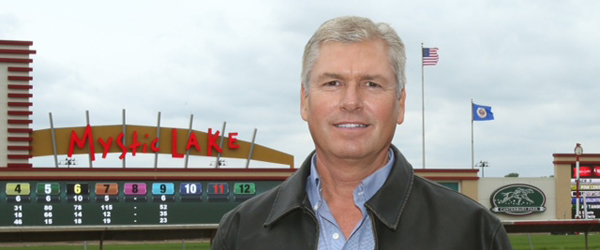 The next time someone tells you there is no such thing as destiny, that anyone who says “it was written in the stars” is one brick short of a full load or that a person’s bloodline has nothing to do with personal choices, talk to Dan McFarlane.
The next time someone tells you there is no such thing as destiny, that anyone who says “it was written in the stars” is one brick short of a full load or that a person’s bloodline has nothing to do with personal choices, talk to Dan McFarlane.
The affable trainer from Phoenix, Ariz., who is racing at Canterbury Park for the first time this summer, puts to rest any such notions in quick order.
McFarlane, 49, was still in high school the summer day he was preparing to leave the Valley of the Sun for a visit to his uncle’s farm in Iowa but was held up by a flat tire.
Bob’s Tire Corral wasn’t far off and McFarlane knew he could get the tire fixed there or buy a used one for $12.50. He got to talking to the owner, Clark Jenkins, who sold just anything you cared to buy at the place, from tires to saddles, trailers, you name it.
“He took an interest in me,” recalled McFarlane.
Jenkins also raced quarterhorses and put McFarlane to work at his ranch when he returned from his trip to Iowa. That was McFarlane’s introduction to the game. He later discovered that his great, great uncle had been a prominent trainer and that his grandfather had been in the horse business, too.
“It just skipped a couple of generations,” McFarlane said.
McFarlane’s uncle was Robert McGarvey who saddled eight starters in the Kentucky Derby – including three who finished third – from 1928 to 1951. McFarlane’s grandfather, Harold Hutchinson, worked for McGarvey.
“I have a picture of my grandfather holding the winning horse, Martie Flynn, in the winner’s circle of the (1929) Clark Handicap,” McFarlane added.
The pieces simply fell in place, as if they were preordained.
Racing was in the McFarlane bloodlines but nobody had talked about it except in passing. “I didn’t realize it,” he said.
The day after McFarlane graduated from high school in Tempe, he went to work for Owen McDaniel at Prescott Downs. Later, he worked two quarter horse meets at Los Alamitos. He worked summers at the race track and then for his father, who was an electrical contractor in the winter.
Then an article in the Blood Horse lured him out of Arizona. The article mentioned that Michael Dickinson, who trained for Robert Sangster, would be in Maryland working for the coming year so McFarlane began making phone calls and landed a job as a groom with Dickinson. Wherever he went thereafter he kept mental notes on how respected trainers executed their craft.
“I was at Arlington Park and kept notes on how John Gosden did things. I studied them,” McFarlane said. Then came his break with thoroughbreds. “I went back to Arizona and worked for John Basset, a big time quarter horse guy, at Turf Pardise running his thoroughbred barn there.”
As his career advanced, McFarlane typically raced at Turf Paradise during the winter and then went to Southern California to race at the big three, Santa Anita, Hollywood Park and Del Mar. Last year he was at Churchill Downs. The closest he had been to Shakopee before this summer was Prairie Meadows in Iowa.
“I almost came to Canterbury seven years ago, but wound up going back to California instead,” he said. He lost his deposit on an apartment as a result.
His decision to try Minnesota this time?
“The extra money (from the agreement with the Mdewakanton Sioux Community at Mystic Lake) was the main incentive,” he said. “Plus Canterbury has a turf course that Iowa doesn’t have.”
So far. So good.
“I love the facility here,” he said. “The barns, the training track. There’s plenty of room. Everything is great.”
He is still looking for his first win in Shakopee after six starts but is hopeful it will come soon.
McFarlane has 24 horses at Canterbury and has been conditioning them for the deeper racing surface here since he arrived. “I got here late,” he said. “I worked a bunch last week. They skip over the (hard) track in Phoenix, so it takes some training to get them ready here, but I like this track better.”
McFarlane and his wife, Judy, married 27 years, have two children, both grown. He is doing all he can to dissuade them from the racing game.
“I want to keep them away from the horse business,” he said.
Despite the family history.
McFarlane has a silk scarf, given him by his aunt, from a Kentucky Derby in the 1930s, several articles about his uncle, and a cigar box McGarvey once kept. The box contains a gold ring, with the initials Mc.
McGarvey, McFarlane.
It all seems to fit perfectly.
As if it were his destiny, or in his blood.
This blog was written by Canterbury Staff Writer Jim Wells. Wells was a longtime sportswriter at the Pioneer Press and is a member of the Canterbury Park Hall of Fame.